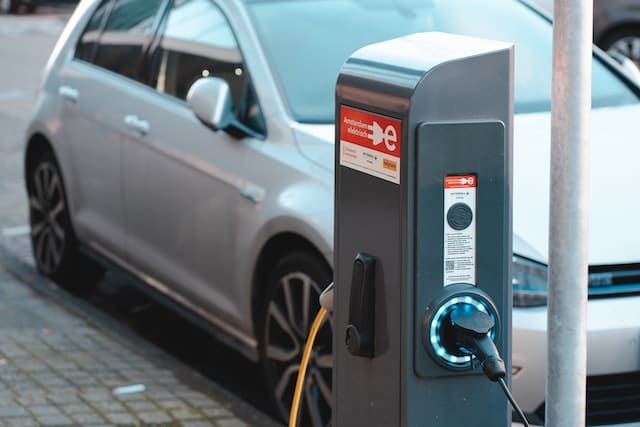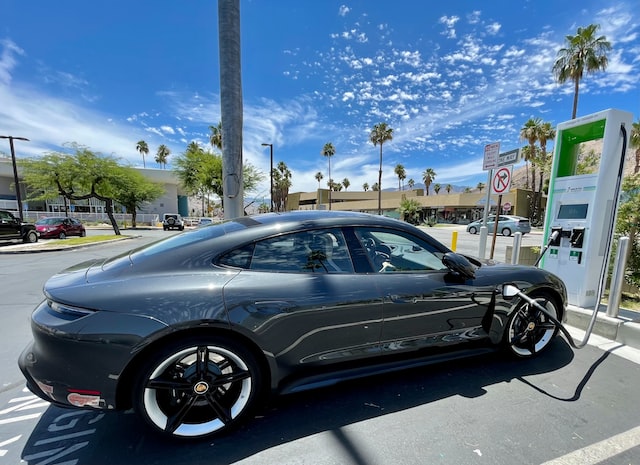Introduction – EVs and Congestion in London, UK
Driving electric cars in London is becoming increasingly popular as the city looks to reduce its carbon footprint. With several new charging points being installed across the capital, it’s now easier than ever to own and operate an electric car in London. Congestion charge electric vehicles in London are exempt from the £15 daily fee while also being able to use the city’s bus lanes. This can save you a considerable amount of money if you’re a regular commuter in the city. Electric cars also emit zero emissions, so they’re much better for the environment than petrol or diesel cars.

If you’re thinking of switching to an electric car, there are a few things you need to know. Here’s our guide to driving electric cars in London.
What Is The London Congestion Charge?
The London Congestion Charge is a charge applied to vehicles driving within the Congestion Charging Zone (CCZ) in Central London. The CCZ was introduced in February 2003 to reduce traffic congestion and improve air quality in the city. The charge is £15 for cars and motorcycles and £23 for buses, coaches, and lorries.

Moreover, the charge is applied daily from 7:00 am to 6:00 pm, Monday to Friday, excluding public holidays. If you pay the amount within 10 days of receiving it, you will receive a discount of 50%. Drivers can pay the charge online, by phone, or at certain retail locations.
The Congestion Charge has had a significant impact on traffic levels in London. In the first year after its introduction, traffic levels in the CCZ fell by 21%. This decrease in traffic has helped to improve air quality and reduce noise pollution in the city. Moreover, it has made London a more pleasant place to live and work. The Congestion Charge is just one of the many measures introduced to improve life in the capital.
Are Electric Cars Exempt From The Congestion Charge?
The answer is no; they are not currently exempt from the charge but they get a massive discount. The reasoning is that electric cars produce zero emissions, so they should get a discount from the charge. The congestion charge is a daily charge levied on vehicles entering certain areas of London during peak hours. The program is called the Cleaner Vehicle Discount and is 90% discounted compared to non EVs.
The charge is designed to discourage drivers from using their vehicles when traffic is heaviest. Electric cars are currently exempt from the charge and they make up a very small percentage of all vehicles on the road.
Does a Tesla pay a congestion charge? The short answer is yes just like other EVs, and Teslas get a discount on the London Congestion Charge. The longer answer is that all-electric vehicles registered with Transport for London (TfL) are eligible for a 100% discount from the Congestion Charge. To qualify, vehicles must be emission-free, have zero tailpipe emissions and be capable of speeds exceeding 60mph. TfL defines emission-free vehicles as those which produce no pollutants from their exhausts.
This includes electric vehicles and some hybrid vehicles. All electric vehicles can get a discount on the Congestion Charge, regardless of make or model. Tesla owners can therefore enjoy almost free travel in the congestion zone without registering or paying any fees.
Who Pays The London Congestion Charge?
The London Congestion Charge is a fee charged to drivers to help reduce traffic congestion in the city. The charge is £15 per day for cars and motorbikes, and £23 per day for buses, coaches, and lorries. The charge applies from Monday to Friday, between 7 am, and 6 pm, and is payable in advance or on the day of travel.
There are several ways to pay the Congestion Charge, including online, by phone, or via text message. Drivers can also pay at certain retail outlets, such as newsagents or petrol stations. Those who live or work within the Congestion Charge zone can apply for a residents’ discount or an exemption from the charge. There are also a number of special discounts and exemptions available for certain vehicles, such as electric or hybrid vehicles.
Failure to pay the Congestion Charge can result in a fine of £130, which is reduced to £65 if paid within 14 days. Repeated failure to pay the charge can result in further penalties, including court action.
How To Register An Electric Car For Congestion Charge?
A growing number of people are switching to electric cars to help the environment and save money on fuel costs. If you live in a city with a congestion charge, you may wonder how to register your electric car to avoid paying the fee. The process is very simple.
First, you must create an account on the congestion charge website – this is the London Road User Charging account. Once you have done this, you will need to provide basic information about your car, including its make, model, and registration number. Then you need to apply for the Cleaner Vehicle Discount on top of that.
You will also need to provide your payment details so that the charge can be deducted from your account each time you drive into the congestion zone. Once your account has been created, you can log in and manage your registration online. You can also contact the congestion charge customer service team if you have any questions or problems with your account.

What Is The London Congestion Charge, And How Does It Differ From The Ultra Low Emission Zone?
The London Ultra Low Emission Zone (ULEZ) is a daily charge applied to most vehicles driven within the Greater London area. The charge is designed to incentivize the use of low-emission vehicles and help improve air quality in the city. Conversely, the Congestion Charge is a daily fee charged for driving into the city during peak hours.
The charge is intended to reduce traffic congestion and raise funds for public transport improvements. While both charges are designed to discourage driving in London, the Congestion Charge applies only during certain times of day, while the ULEZ is in effect 24 hours a day, 7 days a week.
Additionally, the Congestion Charge applies only to vehicles entering the city, while the ULEZ applies to all vehicles driven within the Greater London area. For these reasons, the ULEZ is generally seen as a more effective measure for reducing traffic and improving air quality in the city.
Wrapping Up
In conclusion, the London Congestion Charge is a daily fee for driving into the city during peak hours. The charge is intended to reduce traffic congestion and raise funds for public transport improvements. Electric cars are exempt from the charge, and discounts are available for certain vehicles.
